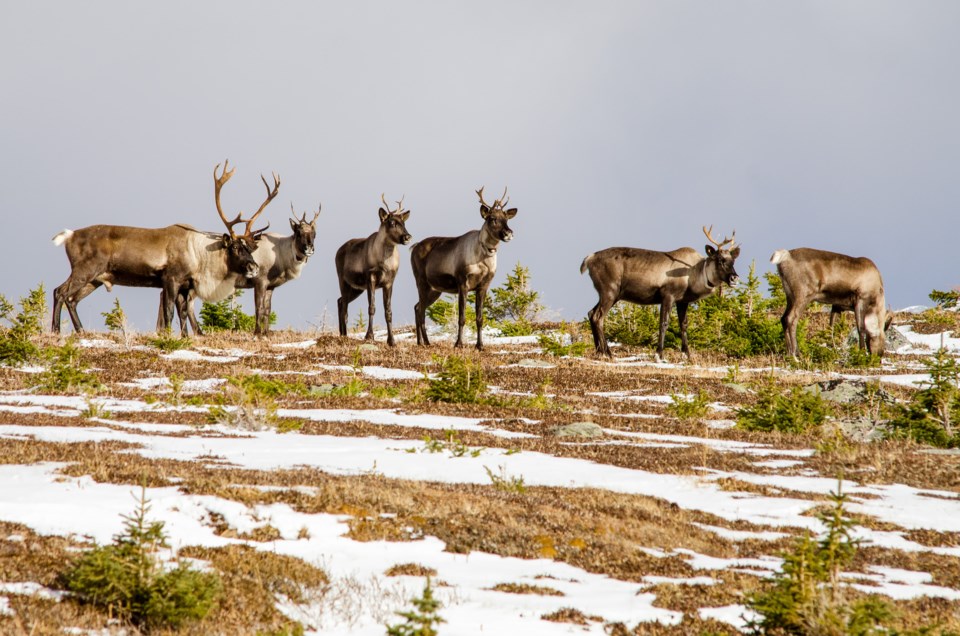JASPER – Two dwindling caribou herds in Jasper National Park have been given a bit of a reprieve while Parks Canada continues working on plans for captive breeding the endangered species.
This year, seasonal closures in the backcountry areas of the Tonquin, Brazeau, and À La Pêche caribou ranges again take effect on Nov. 1, but will remain in place until May 15, which is later than previous years.
Parks Canada officials say private horse use in the Tonquin Valley is also being stopped.
“Without action, the only two caribou herds remaining entirely within Jasper will disappear,” stated a release from Parks Canada.
“Parks Canada is focusing our efforts where they can make the most difference – in the Tonquin and Brazeau herds.”
Closing critical habitat for caribou in winter prevents the development of packed trails from backcountry skiers, snowboarders and snowshoers into high elevation caribou habitat.
Research has shown that packed trails from the valley bottom can make it easier for wolves to travel and prey on caribou in the very places caribou go to avoid predators.
Parks Canada considers the current predation risk to caribou from wolves low, but wolf distribution can change quickly and have large impacts on small caribou herds in a very short time.
For example, until this summer, Parks Canada had not documented wolves entering caribou habitat at high elevations at any time of year since 2016. However, GPS collars on the Sunwapta wolf pack showed the pack spent time in the Tonquin caribou range in August and September 2021.
“Caribou numbers are low and their survival is precarious,” according to the release.
“Losing any of the few female caribou left in the Tonquin and Brazeau herds is one step closer to local extinction.”
In addition to extending the dates of the seasonal winter closures in all occupied caribou ranges, there are changes to the closure boundaries in the Maligne and Brazeau caribou ranges.
In the Brazeau range, the boundaries will be expanded on the west side of Highway 93 to include areas where caribou have been observed in surveys and on remote cameras over the past five years.
As for the Maligne range, there will be no access restrictions because there is no evidence of caribou there.
That herd was declared extirpated in 2020 after the carcass of the last surviving breeding female was discovered buried in snow in 2018 and no other animals were detected. It’s believed a wolverine killed the female caribou.
If caribou are observed in the Maligne range in the future, Parks Canada plans to reassess the closures and reinstate if necessary.
“The northern portion of the Brazeau caribou range that was historically used by both Maligne and Brazeau herds remains closed,” the statement reads.
Conservation groups welcome the federal agency’s decision to extend backcountry access closures for the entire snow season in the Tonquin and Brazeau caribou ranges.
Aerin Jacob, a Canmore-based conservation scientist with Yellowstone to Yukon (Y2Y) Conservation Initiative, said limited closures are one example of how small changes in human behaviour can help sensitive wildlife.
She pointed to the overnight springtime closure of a 17-kilometre stretch on the eastern end of the Bow Valley Parkway in Banff National Park to help breeding wildlife as one successful example.
“Even small-scale actions at the right times of year, in the right places, can help improve connectivity and habitat quality for wildlife,” Jacob said.
On the heels of the recent extirpation of the Maligne caribou herd, the Canadian Parks and Wilderness Society (CPAWS) is relieved to see the priority put on caribou safety for the remaining shrinking herds.
“Managing backcountry access pressures will help provide the added safety net these caribou need to survive near-term,” said Gillian Chow-Fraser with CPAWS Northern Alberta chapter.
Banff National Park’s remnant caribou herd was wiped out in an avalanche north of Lake Louise in 2009.
Parks Canada is now working on maintain ecological conditions needed to support the planned captive breeding program to save Jasper’s remaining caribou. The federal government recently allocated $24 million to the project.
The plan is to breed caribou in captivity at a fenced facility to be built near Athabasca Falls, with its first priority to boost the 45-member Tonquin herd – the largest of the remaining herds – to a self-sustaining population of at least 200 animals.
Parks Canada says current conditions in Jasper National Park support rebuilding caribou populations.
Sightings, surveys, and GPS collars have confirmed there are at least nine females in the Tonquin herd.
Parks has also confirmed that three of these females gave birth to calves this spring, and there are likely four more pairings of cows and calves.
“This is a good indication that the Tonquin caribou are doing well despite their low numbers,” the statement says.
Jasper was home to hundreds of caribou in the 1960s and today there are fewer than 60 remaining.
Read more from RMOToday.com



